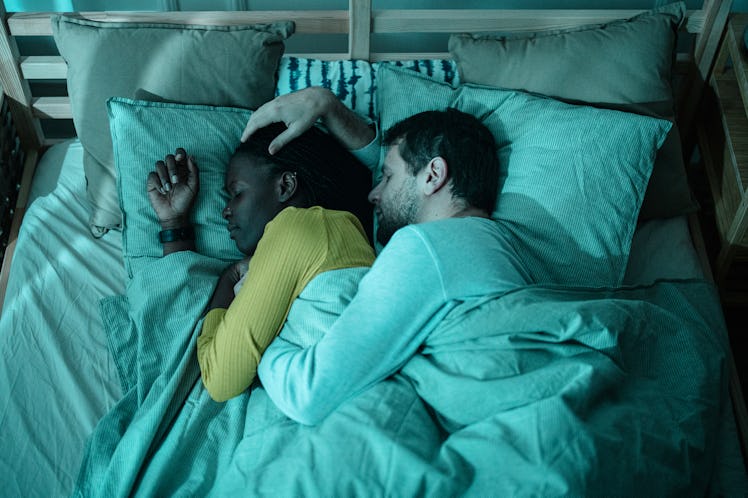Couples Actually Sleep Better Together Than Alone, Study Says
A new study might make you feel differently about the bed hog that sleeps beside you every night.

If you thought sleeping on the sofa to avoid your partner’s snoring, blanket-hog tendencies, and wondering why the norm of couples sleeping together ever became the accepted standard of living for your sleep quality, a new study suggests you may want to rethink your position.
New research from the American Academy of Sleep Medicine of more than 1,000 adults found that people who share a bed with a romantic partner get better sleep than those who go in for solo sleep.
Yeah, for many of us (like those who have bed hogs for bedfellows or who are hot sleepers or who just need space for once) that might sound like a crock of bull. But hey, the data is the data. So if you’re thinking about going forward with a sleep divorce, maybe read this study first.
The researchers found that couples who sleep together fall asleep faster, exhibit lower tendencies toward sleep apnea, and stay asleep longer than those who don’t. They also experience milder insomnia, more time asleep, and less fatigue than couples who sleep separately. Yes, really. And if that’s not enough, sharing a bed with your romantic partner can also lower depression, anxiety, and stress, and make you feel more satisfied with your life and relationships.
On the flip side, those who slept with their children had opposite results in pretty much every category: worse sleep quality, more incidences of sleep apnea, higher stress levels, and more insomnia. Obviously, your mileage and experience may vary.
All the participants in the study were located in southeastern Pennsylvania, so more research is needed to see if the results hold true across geographic areas, or if there’s something in the water in PA.
“Very few research studies explore this, but our findings suggest that whether we sleep alone or with a partner, family member, or pet may impact our sleep health,” Michael Grandner, Ph.D., director of the Sleep and Health Research Program at the University of Arizona and senior study author, said in a statement. “We were very surprised to find out just how important this could be.”
This article was originally published on